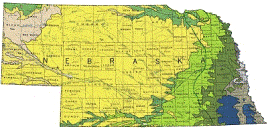United States Geological Survey

United States Geological Survey: Staff Publications
Document Type
Article
Date of this Version
2009
Abstract
Conventional and reference-surface mass-balance data from Gulkana and Wolverine Glaciers, Alaska, USA, are used to address the questions of how rapidly these glaciers are adjusting (or ‘responding’) to climate, whether their responses are stable, and whether the glaciers are likely to survive in today’s climate. Instability means that a glacier will eventually vanish, or at least become greatly reduced in volume, if the climate stabilizes at its present state. A simple non-linear theory of response is presented for the analysis. The response of Gulkana Glacier is characterized by a timescale of several decades, but its stability and therefore its survival in today’s climate are uncertain. Wolverine seems to be responding to climate more slowly, on the timescale of one to several centuries. Its stability is also uncertain, but a slower response time would make it more susceptible to climate changes.


Comments
Published in Annals of Glaciology 50 (2009).